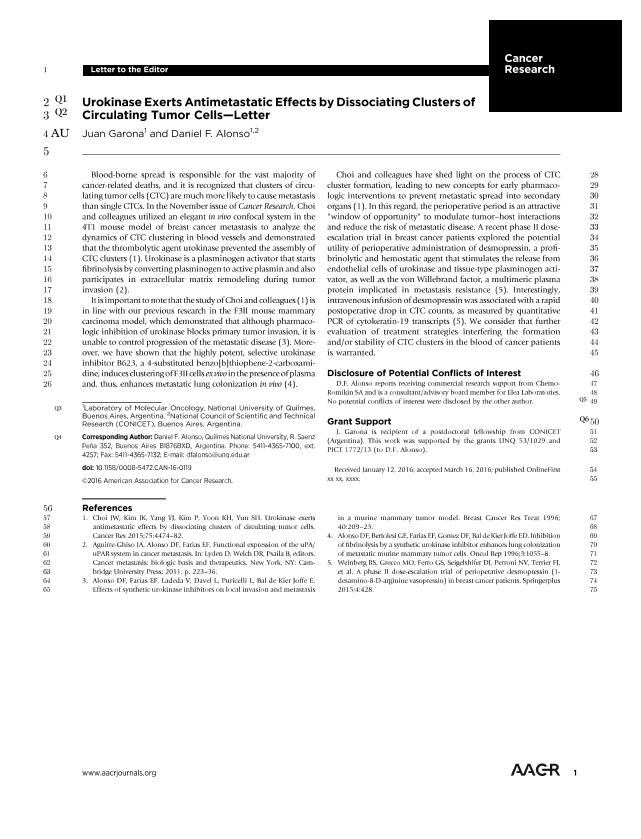Mostrar el registro sencillo del ítem
dc.contributor.author
Garona, Juan

dc.contributor.author
Alonso, Daniel Fernando

dc.date.available
2018-05-31T20:39:40Z
dc.date.issued
2016-08
dc.identifier.citation
Garona, Juan; Alonso, Daniel Fernando; Urokinase Exerts Antimetastatic Effects by Dissociating Clusters of Circulating Tumor Cells–Letter; American Association for Cancer Research; Cancer Research; 76; 16; 8-2016; 4908-4908
dc.identifier.issn
0008-5472
dc.identifier.uri
http://hdl.handle.net/11336/46913
dc.description.abstract
Blood-borne spread is responsible for the vast majority of cancer-related deaths, and it is recognized that clusters of circulating tumor cells (CTC) are much more likely to cause metastasis than single CTCs. In the November issue of Cancer Research, Choi and colleagues utilized an elegant in vivo confocal system in the 4T1 mouse model of breast cancer metastasis to analyze the dynamics of CTC clustering in blood vessels and demonstrated that the thrombolytic agent urokinase prevented the assembly of CTC clusters (1). Urokinase is a plasminogen activator that starts fibrinolysis by converting plasminogen to active plasmin and also participates in extracellular matrix remodeling during tumor invasion (2). It is important to note that the study of Choi and colleagues (1) is in line with our previous research in the F3II mouse mammary carcinoma model, which demonstrated that although pharmacologic inhibition of urokinase blocks primary tumor invasion, it is unable to control progression of the metastatic disease (3). Moreover, we have shown that the highly potent, selective urokinase inhibitor B623, a 4-substituted benzo[b]thiophene-2-carboxamidine, induces clustering of F3II cells ex vivo in the presence of plasma and, thus, enhances metastatic lung colonization in vivo (4). Choi and colleagues have shed light on the process of CTC cluster formation, leading to new concepts for early pharmacologic interventions to prevent metastatic spread into secondary organs (1). In this regard, the perioperative period is an attractive “window of opportunity” to modulate tumor–host interactions and to reduce the risk of metastatic disease. A recent phase II dose-escalation trial in breast cancer patients explored the potential utility of perioperative administration of desmopressin, a profibrinolytic and hemostatic agent that stimulates the release from endothelial cells of urokinase and tissue-type plasminogen activator, as well as the von Willebrand factor, a multimeric plasma protein implicated in metastasis resistance (5). Interestingly, intravenous infusion of desmopressin was associated with a rapid postoperative drop in CTC counts, as measured by quantitative PCR of cytokeratin-19 transcripts (5). We consider that further evaluation of treatment strategies interfering with the formation and/or stability of CTC clusters in the blood of cancer patients is warranted.
dc.format
application/pdf
dc.language.iso
eng
dc.publisher
American Association for Cancer Research

dc.rights
info:eu-repo/semantics/openAccess
dc.rights.uri
https://creativecommons.org/licenses/by-nc-sa/2.5/ar/
dc.subject
Urokinase
dc.subject
Antimetastatic
dc.subject
Desmopressin
dc.subject
Cancer Treatment
dc.subject.classification
Otras Ciencias de la Salud

dc.subject.classification
Ciencias de la Salud

dc.subject.classification
CIENCIAS MÉDICAS Y DE LA SALUD

dc.title
Urokinase Exerts Antimetastatic Effects by Dissociating Clusters of Circulating Tumor Cells–Letter
dc.type
info:eu-repo/semantics/article
dc.type
info:ar-repo/semantics/artículo
dc.type
info:eu-repo/semantics/publishedVersion
dc.date.updated
2018-05-29T21:11:16Z
dc.identifier.eissn
1538-7445
dc.journal.volume
76
dc.journal.number
16
dc.journal.pagination
4908-4908
dc.journal.pais
Estados Unidos

dc.journal.ciudad
Filadelfia
dc.description.fil
Fil: Garona, Juan. Consejo Nacional de Investigaciones Científicas y Técnicas; Argentina. Universidad Nacional de Quilmes. Departamento de Ciencia y Tecnología. Laboratorio de Oncología Molecular; Argentina
dc.description.fil
Fil: Alonso, Daniel Fernando. Consejo Nacional de Investigaciones Científicas y Técnicas; Argentina. Universidad Nacional de Quilmes. Departamento de Ciencia y Tecnología. Laboratorio de Oncología Molecular; Argentina
dc.journal.title
Cancer Research

dc.relation.alternativeid
info:eu-repo/semantics/altIdentifier/doi/http://dx.doi.org/10.1158/0008-5472.CAN-16-0119
dc.relation.alternativeid
info:eu-repo/semantics/altIdentifier/url/http://cancerres.aacrjournals.org/content/76/16/4908.long
Archivos asociados
